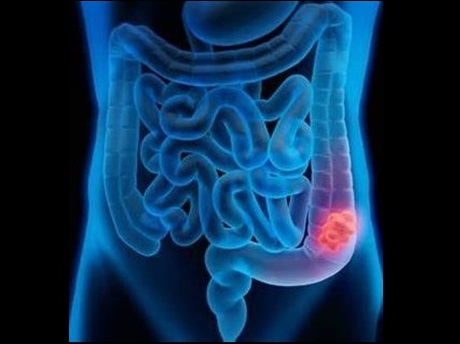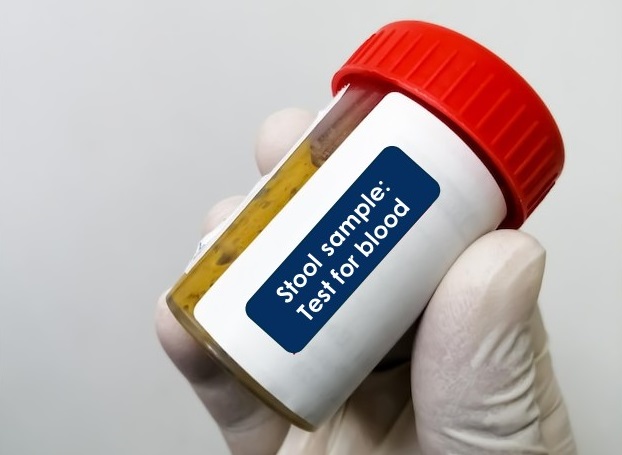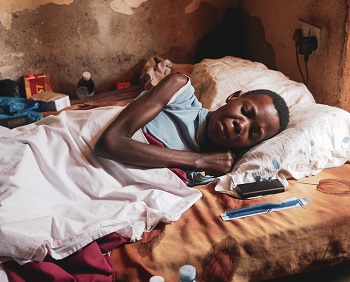DLHA Staff writer.

Cartoon image showing a common location for colon cancer
The truth is, there may be no warning symptoms of note until it is too late! So preventive screening is crucial.
In Sub-Sahara Africa, colon or colorectal cancer is the 5th commonest cancer and the third most common cancer cause of death in the region.
Unfortunately, awareness about this easily preventable but deadly condition is very low in most African countries.
So, what should you know and do about it?
Well, colon cancer typically affects older adults from age 60 and above, although it can occur at any age. More cases of the condition are now being seen in adults younger than 50 years worldwide.
Colon cancer usually begins as a small, noncancerous (benign) growth of cells in tissues of the bowel, called polyps. Polyps form on the inside of the colon and over time some of these can become cancerous.
Pre-cancerous and early cancerous polyps may produce few, if any, symptoms. When they produce symptoms, most people assume that the symptoms are due to other non-serious conditions of the bowel. So, they often ignore these warning signs.
Let's dive in to discuss some of the most significant warning symptoms of colon (colorectal) cancer so that you can take informed decision about how to prevent this disease from happening to you.
Remember, the saying; “prevention is better than cure”!
1. Blood in stool

Container with stool sample for blood in stool test.
In close to half of colon cancer patients, blood in stool is an initial and significant symptom or warning sign. Of course, blood in stools can be due to any number of bowel issues, so cancer is not the only possible cause.
In people under the age of 50 years, blood in stool has been linked to a five-fold higher risk for colon cancer, compared to people without this symptom.
Unfortunately, most Africans either do not seek medical attention or delay doing so out of the assumption that they probably have haemorrhoids (pile).

A young black man with both hands over the abdomen suggesting feelings of pain. Image credit: Freepik
Lower abdominal cramps and discomfort with or without bloating is the next most important symptom that people with colon cancer may have. The pain may be right or left-sided or both.
The abdominal cramp may occasionally be made worse by eating certain types of food (e.g. spicy food) or drink (especially alcohol).
As a result of the cramp, you may reduce the amount of food that you eat. This can result in unintended weight loss.
You may have occasional abdominal cramp due to poor diet choices or dehydration. This is commonly settled with rest, self-care and better hydration.
When your abdominal cramp however is consistent and limits your food intake, it should be concerning. This should prompt you to seek medical help early.
3. Noticeable change in bowel habits

A black man sitting on a toilet bowl.
This is also a warning sign (red flag) for colon cancer.
It should raise concerns if your stooling habit becomes more often, looser, runnier (diarrhoea) and accompanied with abdominal pain.
You should also be concerned if you are consistently constipated and pass bulky, clumpy and pebble-like stool with occasional loose, runnier stool.
Any noticeable and sustained change in your bowel habit should prompt the seeking of medical help.
Bristol Stool Chart with added notes to highlight the importance of stool type and size when describing your symptoms.
It is uncommon for normal people to pass long, pencil-thin stool. When this happens all the time, it is often due to colon cancer, or any other cause of partial bowel obstruction that is located either at the end of the colon or is present in the entire inside of the colon.
If you notice your stool getting pencil-thin, it is advisable to contact your doctor immediately.
.
5. Unintentional Weight loss

An African cancer patient who has lost weight unintentionally, lying in bed at home.
If you are losing weight without intending to do so, that should always be concerning, because, as far as colon cancer is concerned, it could be due to a variety of factors including:
All of these causes of unintended weight loss can make you feel weak and tired (fatigued) often.

A seated black patient talking with a smiling young black doctor.
Given all the warning symptoms described here, the best advice is, don’t delay in seeking medical help if you notice any of them.
You should start talking with your doctor from about age 40 – 50 years about having routine diagnostic colon cancer screening -- either via stool-based tests and/or colonoscopy/sigmoidoscopy.
Early detection is the best prevention and also produces the best treatment outcomes for colon cancer care.
Related:
Colon cancer Symptoms, Causes, Risk factors, Diagnosis, Treatment and Prevention
Published: May 27, 2024
© 2024. Datelinehealth Africa Inc. All rights reserved.
Permission is given to copy, use and share content for non-commercial purposes without alteration or modification and subject to attribution as to source.
DATELINEHEALTH AFRICA INC., is a digital publisher for informational and educational purposes and does not offer personal medical care and advice. If you have a medical problem needing routine or emergency attention, call your doctor or local emergency services immediately, or visit the nearest emergency room or the nearest hospital. You should consult your professional healthcare provider before starting any nutrition, diet, exercise, fitness, medical or wellness program mentioned or referenced in the DatelinehealthAfrica website. Click here for more disclaimer notice.